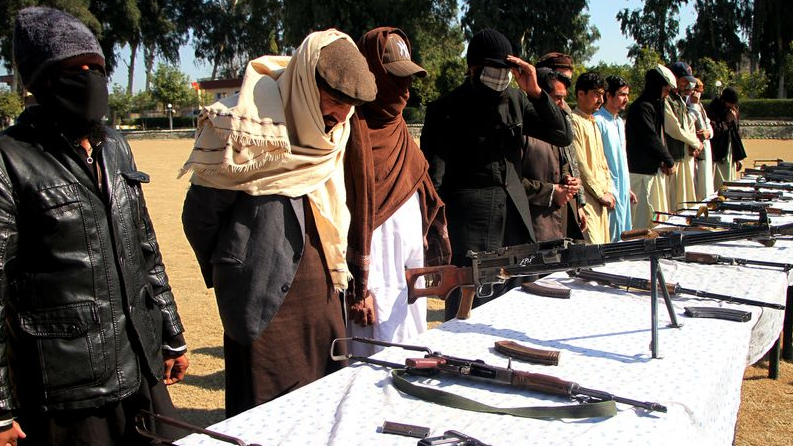Zamir Ahmed Awan: Expectations for Afghan peace deal
March 05 , 2020
Taliban fighters attend a surrender ceremony in Jalalabad city, capital of
Nangarhar province, Afghanistan, February 8, 2020. [Photo/Xinhua]
By Zamir Ahmed Awan, a senior fellow with Center for China and Globalization(CCG)
The expectations were very high regarding the Afghan peace agreement signed
on Feb 29 in Doha, the capital of Qatar, between the US officials and
Taliban, aiming to end the United States’ longest war, fought in
Afghanistan since 2001. The signing ceremony was attended by the
representatives from Pakistan, Qatar, Turkey, India, Indonesia,
Uzbekistan and Tajikistan, which will pave the way for the US to
gradually withdraw its troops in a period of 14 months.
Forty years of instability in Afghanistan was a major hurdle in the peace,
stability and prosperity of the whole region. The regional nations,
especially the neighboring countries, very much desired peace and
stability in Afghanistan. Pakistan was a country which suffered for four
decades due to the situation in Afghanistan. The net loss of 8,000
precious lives, an estimated economic loss worth $250 billion was in
addition to political and social damage to Pakistan. Drug culture, gun
culture and terrorism were the gifts of Afghan unrest. Pakistan will be
the first country wishing peace in Afghanistan.
For the signing of the Afghan peace deal, credit goes to President Trump,
as the previous administration of President Obama, in spite of efforts,
could not manage to reach such a peace deal. The deal may benefit him in
the presidential elections to be held in November 2020. On the other
hand, it paves the way to withdraw troops from Afghanistan with dignity,
without losing face. The US spent two decades, almost a trillion
dollars, and allied forces of up to 200,000 from 46 nations, but could
not gain control over a single inch of Afghanistan. The public in the US
was asking for accountability for their tax money and achievements in
Afghanistan. There was huge pressure on the US administration. The peace
deal will save any further loss to the US and will also serve for
face-saving purposes politically.
Is this peace deal a permanent solution for Afghanistan? Will there be
perfect peace in Afghanistan? Will the common man get relief? Will this
deal have any positive impact on the region, especially in terms of
stability and prosperity? Many more similar questions come into our
minds.
It is good to be optimistic, but we also need to be realistic too. I think
the deal lacks many vital components, like the share of the Taliban.
The Taliban, who fought for two decades and control most of Afghanistan
as an actual pillar of power in the nation, were undermined and given
less of a share. The current Afghan government of Ashraf Ghani or the
previous one led by Hamid Karzai, both backed by the US, funded heavily
and supported out of the way, have failed to control any part of
Afghanistan, yet were given more than their due share, which is totally
unjustified.
It was the desire of the US to give India a role in Afghanistan. Yet India
has no border with Afghanistan; no cultural, language or religious link
with Afghanistan; and no common interests or historical linkages. It
also may not be able to deal with Afghanistan. The Indian foreign
minister, in Kabul recently, is considered out of context. In fact,
Pakistan shares rivers, mountains, borders, religion, culture, language,
history and traditions with Afghanistan, yet the two nations have been
kept apart. Pakistan was approached only for bringing the Taliban to the
negotiating table, and Pakistan did it very well.
Regional stakeholders such as Iran, Tajikistan, China, Russia, Pakistan and
other central Asian countries were not involved. The stakeholders were
supposed to be taken into confidence and given a role or ownership for
implementation, for a sustainable solution.
It seems President Trump was interested in using it during his election
campaign and withdrawing troops without losing face. He might achieve
both goals. But the peace in Afghanistan is still rather far away. The
first setback has appeared in the release of Taliban prisoners, which is
part of the peace deal but was denied by the Afghan government of
Ashraf Ghani. More issues are expected to appear soon. The Afghan
government was fighting against the Taliban for almost two decades, and
with their mutual hatred at a peak, reconciling is an uphill task. The
Taliban cannot accept the upper hand of the Afghan government, which was
only backed by the US. The Taliban has sacrificed a lot and expects an
appropriate return for their struggle and sacrifices.
There are foreign elements in Afghanistan who may also sabotage Afghan peace,
as it suits them to have an unstable Afghanistan, where they can
exploit the situation for their own interests, like Israel and India.
China has built advanced infrastructure in Pakistan under CPEC and would like
to extend this to Afghanistan and other countries of the region for
enhanced connectivity. Economic activities could be enhanced rapidly if
Afghan stability is restored. All neighboring countries wish for a
sustainable peace for Afghanistan. They have suffered for four decades
and that should come to an end. Our best wishes are for the people of
Afghanistan only.

Zamir Ahmed Awan is a
senior fellow with Center for China and Globalization(CCG) and a
sinologist at the National University of Sciences and Technology.
Topical News See more






